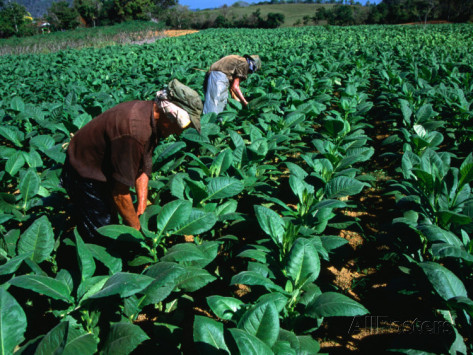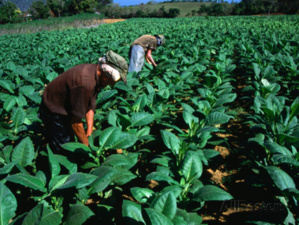Historically, soil conditions along with climatic conditions make the municipalities of San Juan Luis, and Pinar del Rio, and the region of Vuelta Abajo, in Cuba, an ideal place to grow some of the world’s best cigars. Tobacco is planted every year in these localities in farms totaling to 15,940 hectares. Once the tobacco leaves are plucked they are hand-rolled and exported and bring in precious foreign exchange for the Cuban economy. Today cigars are Cuba’s fourth top export.
With the talk of normalization of relations with the United States, and the opening of the sanction that had been placed on Cuba by the U.S since 1962, have made tobacco workers wonder, how this process of normalisation is going to affect their work.
A woman named Borrego, felt that “it would be good” that Cuban cigars can now be legally exported to the U.S. She hoped that the benefits of this increased export will trickle down to the growers and the workers who slog in the farms. It is certainly going to act as an incentive since, currently “… there is a shortage of both female and male workers since people don’t like the countryside.”
For Cubans, its famed coffee, habanos and rum represent a huge trade opportunity. With the approaching second round of talks between the two countries, normalisation of bilateral ties is looming on the horizon. Ever since a Cuban cigar was presented to the U.S President Barrack Obama on the December 17th 2014, and the announcement of restoration of ties a few hours later, habanos have gained immensely and are increasingly seen as a symbol of the thaw in relations between the U.S and Cuba.
Amongst the first measures that was approved by the U.S Government was the boosting of trade in cigars and rum: U.S tourists can now legally bring back $100 worth of rum and cigar on their way back from Cuba. Although this may be an insignificant amount in economic terms for Cuba, however it is very symbolic. Nicaraguan and Dominican cigars though continue to be banned in the U.S, and the U.S business houses have still not been given the green light to for investment opportunities in the tobacco industry, in Cuba.
The opening up of the ties in relation between the two countries, have created certain expectations for the rise of pay scales for Cuban tobacco workers. Cuban cigars are already a brand and fetch a premium. The opening of the U.S market to Cuban cigar can be a huge export opportunity. “If the company sells more, I think they would pay us better,” said Berta Borrego, a Cuban tobacco worker who has been working in this line of work for more than 30 years.
As per experts in this field, although Cuban cigars are known for their quality, Cuba however is not amongst the world’s biggest producers. The world’s largest cigar manufacturers are China, U.S., Brazil, India and Turkey, in this order. Unfortunately it is also not amongst the nations with the highest yield, which are, Taiwan, Spain, Italy, Japan, U.S, in this order.
To make the situation even worse, for Cuba, armed conflicts around the world, High European import tariffs and now climate change have made the exports of the famed cigar quite daunting. In fact in 2013-2014, the sale of Habanos SA, fell by 1%. However, Cubans hope, with the normalisation of relations with the U.S, exports of their famed cigars will see a northward movement. What is to be noted is that, it is the U.S Congress that can authorise the normalisation of ties and not the U.S President.
Experts believe that when the normalisation of the ties does happen, exports of the famed habanos will see an annual climb of at least $250 million. This is as per experts who form part of a joint venture between Cuba’s stated owned Tabacuba and England’s Imperial Tobacco Group PLC.
In order to rise up to the prospects of increasing exports and the dual challenge of climate change and global warming, tobacco growers are starting to go ecologically conscious. “El Gallego”, or Pérez, is a known figure in Cuba’s tobacco industry. He is now starting to invest in green technologies with which he hopes he will not only survive but thrive in the upcoming new environment, which the normalisation of the U.S Cuba relation will bring.
He has not only invested in a modern seedbed, but is now increasingly getting involved in conservation agriculture, planting a variety of tobacco instead of sticking to one particular variety, cutting down by as much as 30% of his insecticide usage, and using organic fertiliser.
“I never thought I’d reach the yields I’m obtaining now. Applying science and different techniques has made me see tobacco in a different light,” he says.
References:
http://www.ipsnews.net/2015/02/tobacco-workers-in-cuba-dubious-about-opening-of-u-s-market/
With the talk of normalization of relations with the United States, and the opening of the sanction that had been placed on Cuba by the U.S since 1962, have made tobacco workers wonder, how this process of normalisation is going to affect their work.
A woman named Borrego, felt that “it would be good” that Cuban cigars can now be legally exported to the U.S. She hoped that the benefits of this increased export will trickle down to the growers and the workers who slog in the farms. It is certainly going to act as an incentive since, currently “… there is a shortage of both female and male workers since people don’t like the countryside.”
For Cubans, its famed coffee, habanos and rum represent a huge trade opportunity. With the approaching second round of talks between the two countries, normalisation of bilateral ties is looming on the horizon. Ever since a Cuban cigar was presented to the U.S President Barrack Obama on the December 17th 2014, and the announcement of restoration of ties a few hours later, habanos have gained immensely and are increasingly seen as a symbol of the thaw in relations between the U.S and Cuba.
Amongst the first measures that was approved by the U.S Government was the boosting of trade in cigars and rum: U.S tourists can now legally bring back $100 worth of rum and cigar on their way back from Cuba. Although this may be an insignificant amount in economic terms for Cuba, however it is very symbolic. Nicaraguan and Dominican cigars though continue to be banned in the U.S, and the U.S business houses have still not been given the green light to for investment opportunities in the tobacco industry, in Cuba.
The opening up of the ties in relation between the two countries, have created certain expectations for the rise of pay scales for Cuban tobacco workers. Cuban cigars are already a brand and fetch a premium. The opening of the U.S market to Cuban cigar can be a huge export opportunity. “If the company sells more, I think they would pay us better,” said Berta Borrego, a Cuban tobacco worker who has been working in this line of work for more than 30 years.
As per experts in this field, although Cuban cigars are known for their quality, Cuba however is not amongst the world’s biggest producers. The world’s largest cigar manufacturers are China, U.S., Brazil, India and Turkey, in this order. Unfortunately it is also not amongst the nations with the highest yield, which are, Taiwan, Spain, Italy, Japan, U.S, in this order.
To make the situation even worse, for Cuba, armed conflicts around the world, High European import tariffs and now climate change have made the exports of the famed cigar quite daunting. In fact in 2013-2014, the sale of Habanos SA, fell by 1%. However, Cubans hope, with the normalisation of relations with the U.S, exports of their famed cigars will see a northward movement. What is to be noted is that, it is the U.S Congress that can authorise the normalisation of ties and not the U.S President.
Experts believe that when the normalisation of the ties does happen, exports of the famed habanos will see an annual climb of at least $250 million. This is as per experts who form part of a joint venture between Cuba’s stated owned Tabacuba and England’s Imperial Tobacco Group PLC.
In order to rise up to the prospects of increasing exports and the dual challenge of climate change and global warming, tobacco growers are starting to go ecologically conscious. “El Gallego”, or Pérez, is a known figure in Cuba’s tobacco industry. He is now starting to invest in green technologies with which he hopes he will not only survive but thrive in the upcoming new environment, which the normalisation of the U.S Cuba relation will bring.
He has not only invested in a modern seedbed, but is now increasingly getting involved in conservation agriculture, planting a variety of tobacco instead of sticking to one particular variety, cutting down by as much as 30% of his insecticide usage, and using organic fertiliser.
“I never thought I’d reach the yields I’m obtaining now. Applying science and different techniques has made me see tobacco in a different light,” he says.
References:
http://www.ipsnews.net/2015/02/tobacco-workers-in-cuba-dubious-about-opening-of-u-s-market/






